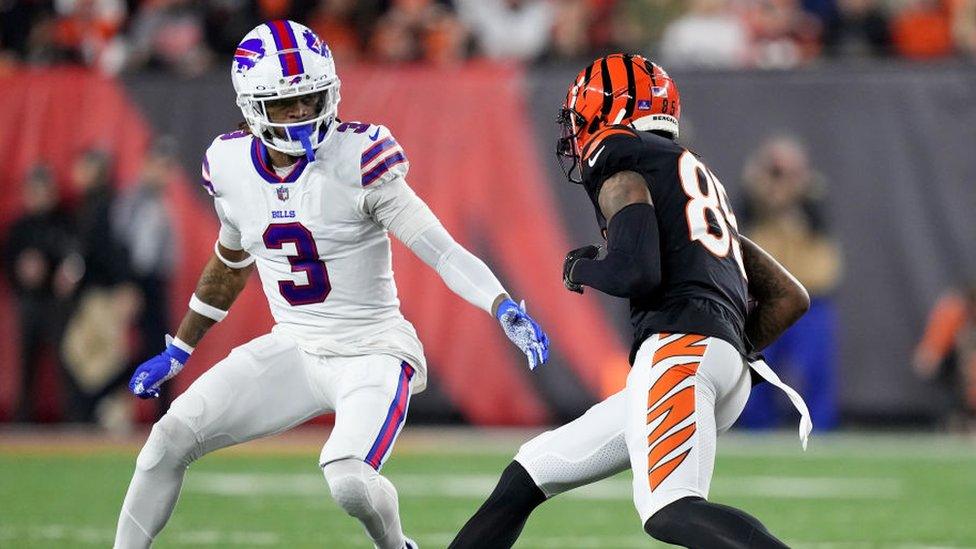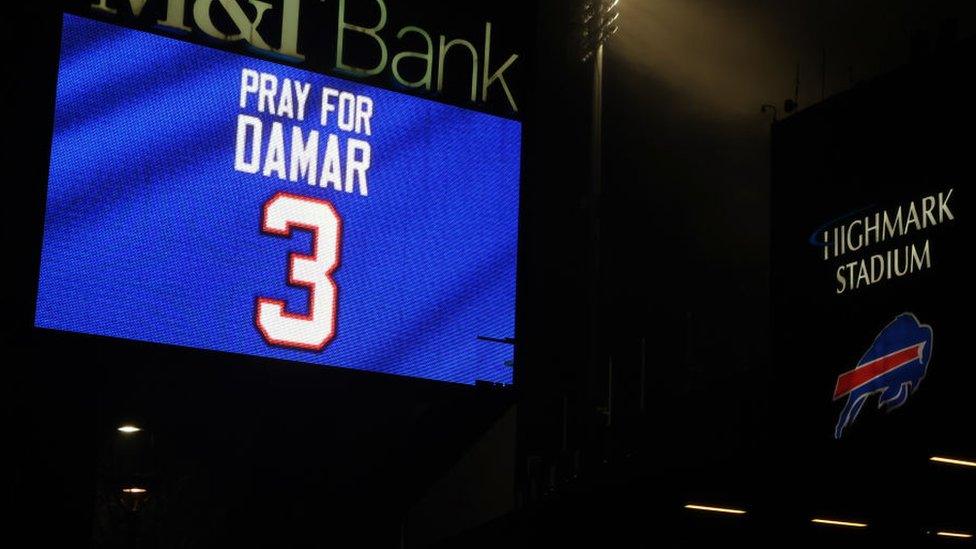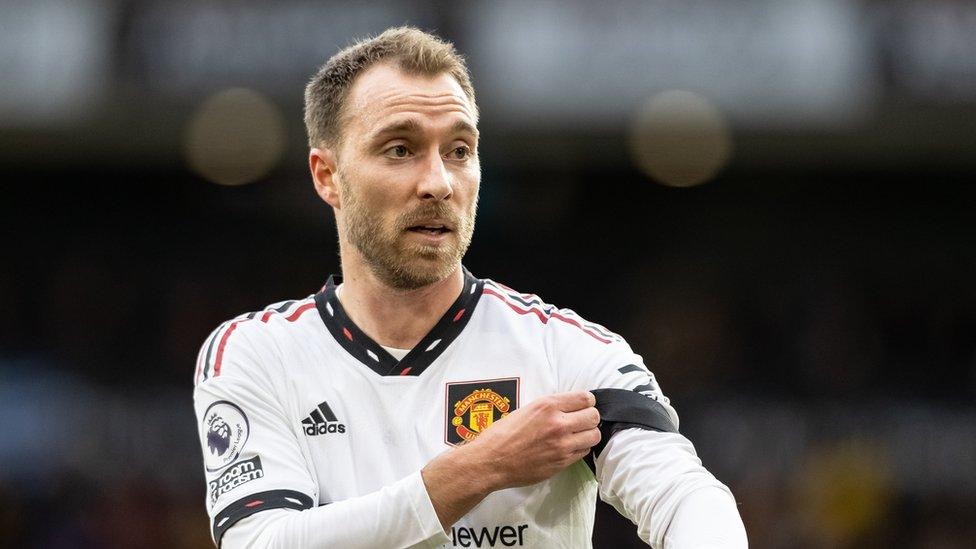Damar Hamlin: How anti-vaxxers exploited player's collapse
- Published

Damar Hamlin attempts a tackle before his collapse on the field on Monday night
Online activists used the on-field collapse of American football star Damar Hamlin to spread anti-vaccination messages starting just minutes after Monday night's incident.
In what has become a familiar pattern since Covid vaccines became available about two years ago, several influential accounts used the event to spread anti-vaccination content.
They included the Georgia congresswoman Marjorie Taylor Greene, who tweeted: "Before the covid vaccines we didn't see athletes dropping dead on the playing field like we do now... Time to investigate the covid vaccines."
That tweet was viewed around a million times within a day. But the idea that young, healthy athletes have never collapsed suddenly before Covid vaccines is easily disproven.
A US study looking at athletes over four years found many unexplained deaths were in fact caused by cardiac arrest, external - a cause more common in male and African-American players.
Previous studies pre-dating Covid-19 note that there are approximately 100 to 150 sudden cardiac deaths, external during competitive sports in the United States each year.
While rare and potentially dangerous cases of heart inflammation have been associated with some Covid vaccines, these real cases have been muddled together with unrelated illnesses and misinterpreted, sometimes cherry-picked data.
Combined with a wave of anti-vaccine activity online throughout the pandemic, it has given birth to a group of activists who ascribe nearly any tragic or unexplained death to vaccines.
The loudest voices in the anti-vaccination lobby have followed this pattern throughout the pandemic, even though heart problems are a symptom of Covid itself.
'Cynical' anti-vax lobby
Hamlin, a defensive back for the Buffalo Bills, suffered a cardiac arrest during Monday night's high-profile matchup against the Cincinnati Bengals.
On Wednesday he remained in hospital, but an uncle said he was showing signs of improving. There has been no further information about any underlying causes which could have contributed to his cardiac arrest.
Research by the Center for Countering Digital Hate (CCDH), a non-profit campaign group based in London and Washington, found that mentions of an anti-vaccine film quadrupled after the player's collapse.
CCDH chief executive Imran Ahmed said activists were "cynically exploiting tragedy to baselessly connect any injury or death of a notable person to vaccinations".
The day after the match the documentary Died Suddenly, which was released in November last year, was mentioned nearly 17,000 times, the CCDH says. The BBC previously looked into the claims in the film and found little or no evidence behind many of them.
Caroline Orr Bueno, a researcher on misinformation who has spent a decade looking at the anti-vaccination movement, says the film gave rise to communities of people across several social media platforms primed to hunt for news events to back up their views.
"They believe the anti-vaccine rhetoric that they are seeing," she says, "and they are joining in out of genuine concern without necessarily knowing that they're being misled."

Googling is not science
A Twitter account promoting the Died Suddenly video sent out a message just minutes after Hamlin was transported off the field in Cincinnati claiming there was an "undeniable pattern".
When contacted for a response, the owners of the account responded with a list of anecdotal reports of athletes suffering heart problems.
Backers of the film and other anti-vaccination activists collect news reports of heart attacks and unexplained deaths, automatically ascribing them to Covid-19 vaccines.
This focused obsession has created a hypersensitive pattern-spotting spiral, with activists and followers often believing the link between every sudden athlete death and vaccines is "obvious", although there is scant solid research to back up their claims.
Heart attack v cardiac arrest
While it might seem unusual for young, healthy people to experience heart problems, there are important differences between a heart attack and cardiac arrest.
Most heart attacks are caused by blockages in arteries and are associated with older people as well as lifestyle factors like smoking and diet.
Most cardiac arrests are caused by a problem with the heart's electrical system which keeps it pumping. These heart rhythm malfunctions are often genetically inherited and can be seen in young people who appear otherwise healthy.
Premier League fans will remember the dramatic moment in 2012 when Bolton's Fabrice Muamba collapsed, having suffered a cardiac arrest. The 23-year-old's heart stopped beating for 78 minutes.
A 2018 study by the Football Association looked back over 20 years of data from screening more than 11,000 players and found not only were cardiac deaths more common than previously thought - although still rare - but that most of them were in people with no previously diagnosed heart problem.
It started with Eriksen
One of the first clear examples of anti-vaccination activists taking advantage of a high-profile news event was the televised collapse of Danish football star Christian Eriksen during the European football championships in June 2021.
Influential accounts immediately began blaming Covid vaccines.
Only after the initial wave of speculation and misinformation was it revealed by the director of Eriksen's club at the time, Inter Milan, that the midfielder had not received a Covid-19 vaccine prior to his collapse, external.

Christian Eriksen recovered from his heart condition, which was not caused by a vaccine
In November, Twitter stopped enforcing its Covid misinformation policy, a development that Imran Ahmed of the CCDH called "particularly worrying".
"Anti-vax lies are deadly and platforms must stop allowing dedicated spreaders of disinformation from abusing their platforms and the trust of other users."
The BBC has contacted Twitter and Marjorie Taylor Greene for comment.